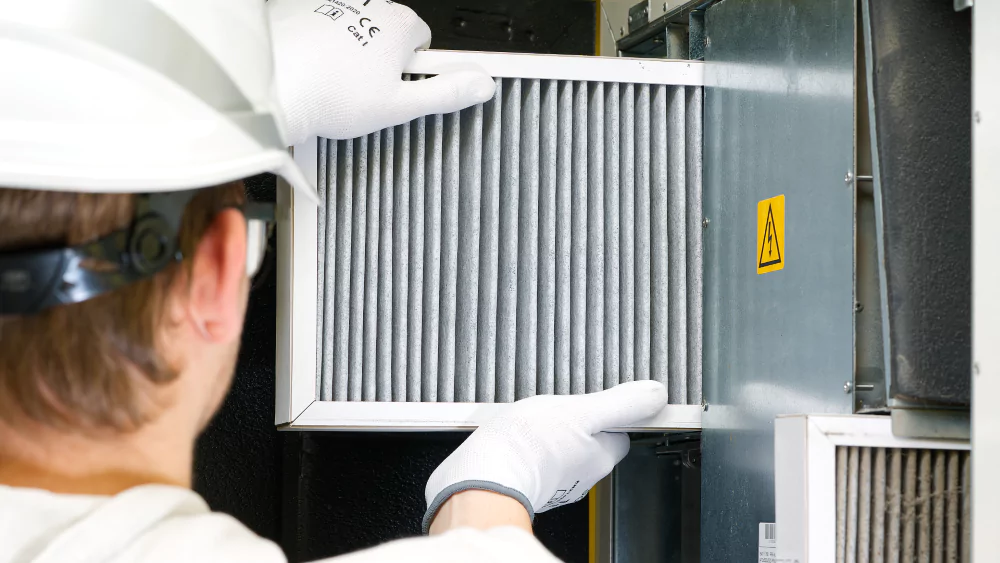Your HVAC (Heating, Ventilation, and Air Conditioning) system plays a crucial role in maintaining a comfortable and healthy indoor environment. While it may seem like a small detail, changing the filters in your HVAC system is an essential task that often gets overlooked. In this article, we will explore why changing HVAC filters is so important, the consequences of neglecting this maintenance task, the common schedule for filter changes, and the potential impact on operating costs.
HVAC filters serve as the first line of defense against airborne particles, dust, allergens, and contaminants that can affect indoor air quality. Here are some reasons why changing these filters is vital:
- Improved Indoor Air Quality:
- Clean filters help remove allergens, dust, and pollutants from the air, leading to healthier indoor air.
- Improved air quality can reduce the risk of respiratory issues and allergies for you and your family.
- Enhanced System Efficiency:
- Clogged or dirty filters restrict airflow, forcing your HVAC system to work harder to maintain the desired temperature.
- A clean filter allows for proper airflow, helping your system operate efficiently and reducing energy consumption.
- Extended System Lifespan:
- Regular filter changes reduce wear and tear on HVAC components, potentially extending the lifespan of your system.
- Fewer breakdowns and repairs can save you money in the long run.
Types of HVAC Filters
There are various types of HVAC filters available, each with different levels of filtration and efficiency. Here are three common types:
- Fiberglass Filters:
- Basic, inexpensive, and disposable.
- Offers minimal filtration and is primarily designed to protect the HVAC system.
- Pleated Filters:
- Made of polyester or cotton paper, providing better filtration than fiberglass.
- More effective at trapping dust and allergens.
- HEPA (High-Efficiency Particulate Air) Filters:
- Highest level of filtration, capturing particles as small as 0.3 microns.
- Ideal for individuals with allergies or respiratory conditions.
Consequences of Neglecting Filter Changes
Failing to change HVAC filters regularly can lead to several undesirable consequences:
- Poor Indoor Air Quality:
- Accumulated dust and contaminants degrade indoor air quality, potentially causing health problems.
- Reduced Efficiency:
- Clogged filters restrict airflow, causing your HVAC system to work harder and consume more energy.
- Increased Operating Costs:
- Higher energy consumption leads to elevated utility bills.
- Neglecting filter changes can result in costly HVAC repairs and replacements.
Common Schedule for Filter Changes
The frequency of filter changes depends on factors like filter type, usage, and air quality. However, here is a general guideline:
- Basic fiberglass filters: Replace every 1-3 months.
- Pleated filters: Replace every 3-6 months.
- HEPA filters: Replace every 6-12 months.
It’s essential to check your filters regularly and adjust the schedule based on your specific circumstances.
Impact on Operating Costs
Neglecting filter changes can significantly impact your HVAC system’s operating costs:
- Increased Energy Bills:
- A clogged filter forces your HVAC system to work harder, leading to higher energy consumption and increased monthly bills.
- Repairs and Replacements:
- Over time, neglected maintenance can lead to HVAC system breakdowns, requiring costly repairs or replacements.
Conclusion
Changing the filters in your HVAC system is a simple yet critical maintenance task that should not be overlooked. By doing so regularly, you can enjoy improved indoor air quality, enhanced system efficiency, and potential cost savings. Neglecting filter changes can lead to poor air quality, reduced efficiency, and higher operating costs. So, mark your calendar and make filter changes a routine part of your HVAC maintenance plan for a healthier, more efficient home.


0 Comments